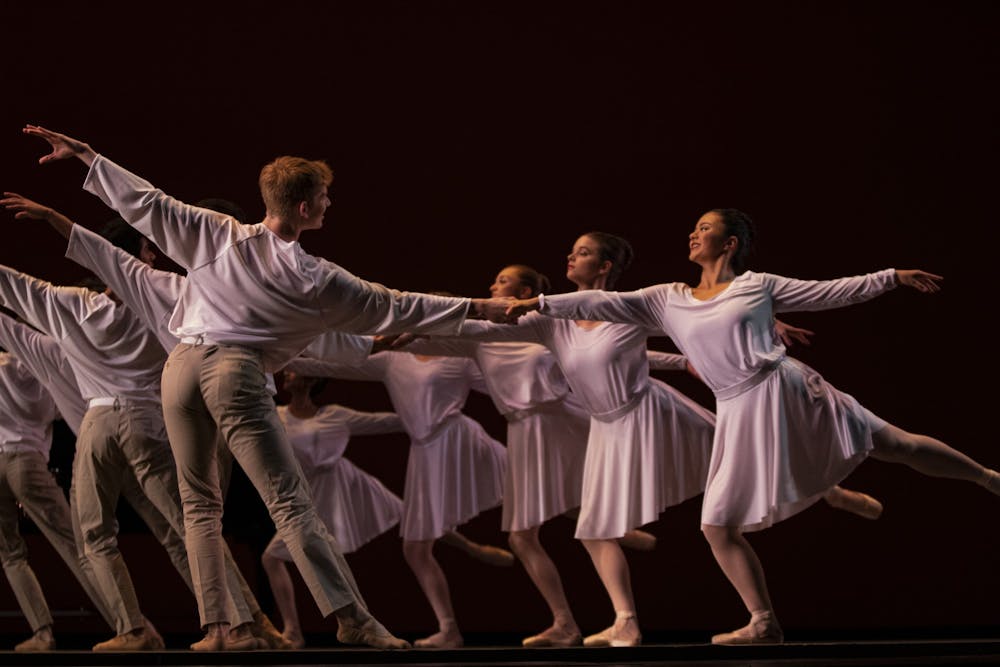On the Friday before our spring break, the IU Ballet Department was rehearsing our then-upcoming performance of “Cinderella.” We ran the show with each of the two casts, with the faculty stopping us on occasion to give notes.
We knew this would probably be our last day together for a while. The dread in the air was palpable. At that point, the rehearsal wasn’t about the show anymore, it was a wistful celebration of how far we had come together. At the end of the day, we hugged the seniors for the last time and went back to our homes to pack.
Sure enough, a few days later, an email from President Michael McRobbie showed up in our inboxes. The party was over. In-person classes had been canceled for the remainder of the semester.
For those of us in the arts and entertainment community, this health crisis has pulled the rug out from under our feet. Our profession is one driven by passion more than anything else. For centuries, dancers have worked near one another in studios, aiming for the goal of performing in front of thousands of people. These past few months, dancers around the world have been locked in often cramped inner-city apartments, clearing away every bit of clutter to practice their art through classes on Zoom.
The dancer’s life is not an extravagant one. It’s not a high-paying profession or one guaranteeing job security into your 40s. Yet through layoffs, canceled seasons and skyrocketing unemployment from mass lockdowns, dancers around the country have kept training, kept working, kept pushing.
Despite the bleak prospects, dancers have supported each other while being forced to innovate. Our professors at IU have retooled the curriculum for dancing in small spaces.
We do more conditioning classes, a rethought technique class and have explored repertory that allows us to work in confined spaces. Our faculty has done its best to keep us inspired through video assignments to push our creative faculties. Sometimes we can be the most creative with the most limits.
Our assignments have mirrored the adaptations of the professional world. The greatest dancers in the world have come together for virtual performances, choreographic collaborations and expressive short films shot in quarantine. Jacob Jonas the Company in Los Angeles is presenting, “Parked,” a drive-through performance in which dancers perform in the street while socially distancing.
Additionally, ballet companies and schools across the world have moved classes online, often opening them up for the first time to the public. In an age when accessibility is crucial, major ballet companies such as New York City Ballet, American Ballet Theatre and San Fransisco Ballet are releasing full-length ballets online in place of their canceled seasons. Performances that often cost a small fortune to see can now be viewed for free.
Despite all of this, ballet is not meant for living rooms. It is meant for the stage. We must get back to the studio, and it needs to happen this fall. I am cautiously encouraged by McRobbie’s intentions for a seemingly hybrid university experience next fall and have full faith in our wonderful faculty as our advocates.
Sometimes I worry dancers think what they do isn't important enough for society. Politicians tend to throw money at problems, but little is said about the arts. To echo German Chancellor Angela Merkel, however, the arts are essential and are needed now more than ever. During the Great Depression, people flocked to entertainment such as films and radio for hope, escape and inspiration.
Given that the global pandemic is unlikely to simply disappear, tough choices must be made. We will see staggered schedules, smaller classes and recorded performances without audiences. Older professors may need to teach virtually for some time to come, and the university will be reluctant to allow partnering between two dancers. Unthinkable as it may be, we may have to do without a Nutcracker in December, though I think we should still have it in some form.
Tradeoffs need to be made in the short-term. We need to come back in as smart and as healthy as possible, but we must come back this fall. It is essential.
Robert Mack is a rising senior studying ballet and history.




